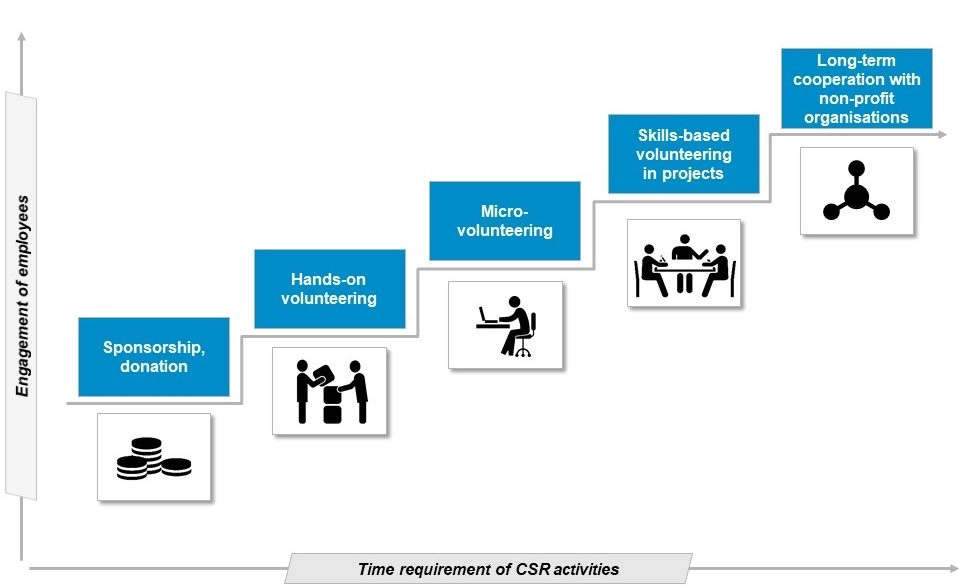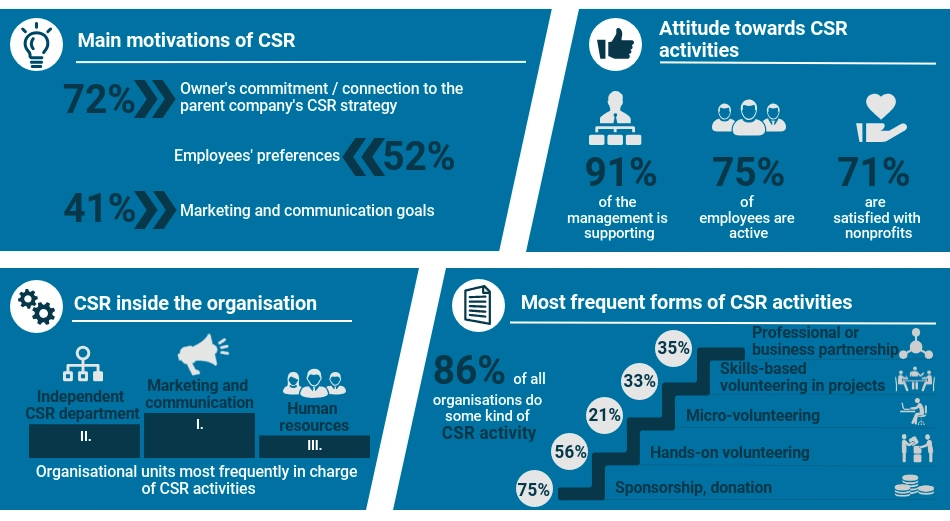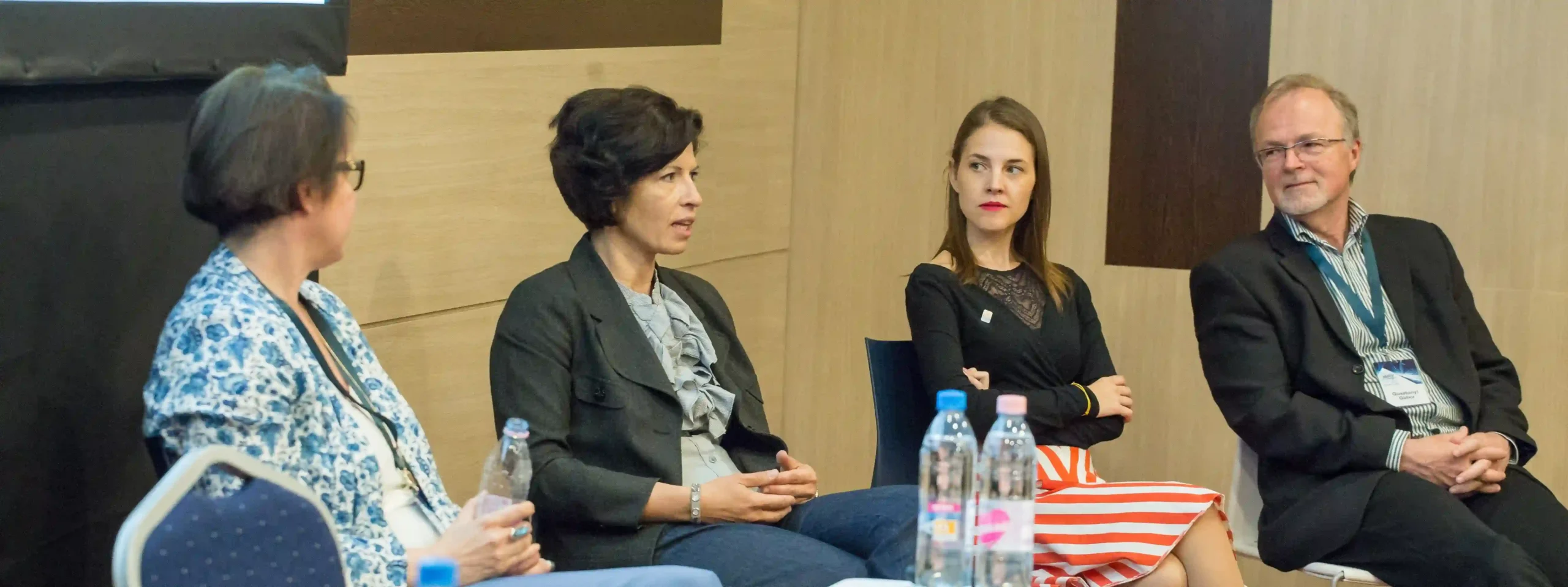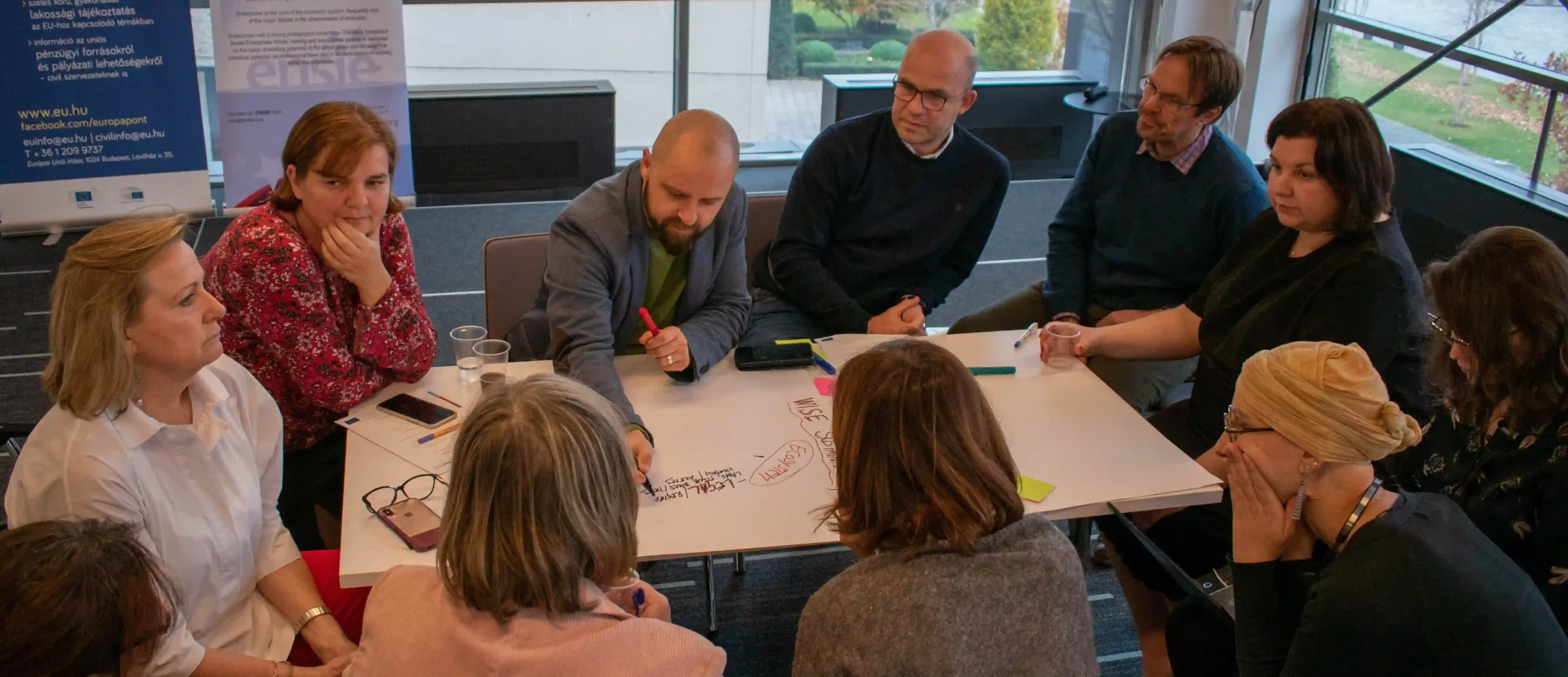Written by: Katalin Porubcsánszki (manager of IFUA Nonprofit Partner)
Due to the perceivable labour shortage and fluctuation in several sectors, companies try to retain and develop their employees. Corporate volunteering programs can play a significant role in achieving this goal.
An important factor in achieving the aforementioned goal is that generations that have entered the labour market in the past few years are becoming more and more conscious regarding social issues. Significant part of the generations Y and Z (those possessing higher education degree) have a strong preference in social causes that are important for them, they do regularly volunteer activities in their private life and corporate social responsibility of companies is also important for them in their everyday consumer choices.
Types of corporate social responsibility activities
Different types of CSR activities require distinct involvement and commitment, so they differ in the magnitude of their sensitizing, developing impact on volunteers and host organisations as well. By the combination of different CSR activities it is possible to multiplicate this impact.

Sponsorship and donation can take the forms of ad hoc / regular financial support, the operation of a grant-giving system or occasional collection of donation among employees (for example clothes, toys). From the point of view of the non-profit sector, struggling with the lack of funds, this is unarguably a very important help, but as for the employees, this type of activity has the smallest effect on commitment and involvement.
Cleaning, packing, gardening, litter picking, painting, building, giving blood can be part of hands-on volunteering. During hands-on volunteering, it is possible to gain field experience about the given social issue, and about the daily operation of the host organisation. This activity can be appealing for business organisations because of its occasional type and team building effect. For non-profit organisations, organizing hands-on volunteering activities – with some exceptions – is rather a challenge than an useful activity, taking into account that there can be quality complaints about the accomplished tasks (due to the non-professional realization).
Micro-volunteering can consist of translating, internet research, editing publications, data recording, personal assistance during events, completing smaller office tasks or short professional tasks. The advantage of micro-volunteering is that volunteers can get involved in short-term, skill-based activities. However, there has to be a strong relationship between the host organisation and the volunteer capacity pool (which can be an organisational unit in charge of corporate CSR or an online platform), because the key to success is fast communication between the two parties.
Skills-based volunteering in projects (or in other terms: pro bono activity) is a professional contribution to the development of non-profit organisations (along pre-defined management topics), and mentoring. This is the CSR activity with the biggest impact for both volunteers and the host organisation. Volunteers can challenge their professional knowledge within a different organisational context, and non-profit organisations can gain a valuable business-oriented approach. It is important, that volunteers should join those kind of non-profit development projects that fit to their own field of expertise. Volunteer management tasks are of key importance in these activities: tasks related to recruitment, preparation, monitoring, evaluation, coordination, communication ensure and strengthen the successful realization of skills-based volunteering activities.
Long-term cooperation with non-profit organisations can be directed to incubation, professional partnership and establishment of supplier or consumer relations. This activity goes beyond skills-based volunteering: it includes mentoring and incubating tasks executed by corporate employees, but their final purpose is – by developing non-profit partners – to extend the professional, supplier or consumer network of the company. Marketing and HR benefits of these CSR activities can be combined with the core business purpose of the company.
What is corporate volunteering?
Volunteering activities can be defined in several ways, they have border areas and controversial categories. However there are some basic characteristics that are indispensable if we are talking about volunteering activities: people do it by their own will; there is no payment in return (or at most reimbursement); beneficiary people are outside of the volunteer’s family (more details for example: Opinion of the European Economic and Social Committee on Voluntary activity: its role in European society and its impact)
Going further with the definition of volunteering, we can talk about corporate volunteering, if basic conditions of volunteering are fulfilled and furthermore, a company supports somehow the participation of its employees in this kind of activity. This support can be material (for example donation of money to a non-profit organisation chosen by the employees or providing place for volunteer projects) or time off work (for example a couple days of volunteering recognised as work-time or projects of non-profit organisations linked to talent programs).
According to this definition, volunteer activities of employees in their free time cannot be considered as corporate volunteering.
A recent survey in the USA also confirmed, that corporate volunteering programmes are likely to offer positive experience for employees if these conditions – among others – are fulfilled:
- There has to be a well-defined focus and expected result;
- The employer should support the realization of volunteer activities by paid days off;
- The involvement should be truly volunteer (instead of compulsory);
- The volunteering activity could be carried out during working hours.
Establishment of corporate volunteer activities
During the establishment and development of corporate volunteering activities, some conceptual questions can come up that need to be clarified in advance:
- The effect we want to achieve: Do we want to achieve CSR benefits, HR benefits or business development goals?
- Content of volunteering activities: Which type of CSR activities do we want to realize?
- Geographical focus of volunteering activities: Do we plan step-by-step geographical extension with the launch of volunteering activities?
- Focus group of volunteers: Do we want to address actual colleagues (or a well-defined group of them) or former colleagues too, or even future, to-be colleagues (with a recruitment purpose)?
- Focus topic: Do we want to carry out volunteering activities connected to the core business activities or to the support functions of the company?
- Non-profit organisation focus: Do we want to work with current non-profit partners, with organisations suggested by employees or with organisations chosen during a public call for application?
In Anglo-Saxon countries pro bono activities and corporate volunteering have strong traditions. America’s Charities gives the following tips to companies on how to develop their volunteer programs:
- The volunteering program should align with the values of the company and this relation should be communicated.
- Employees should be supported and they should be handled as partners in the establishment and execution of volunteering activities.
- Several choices should be offered to the employees, let’s create space for their initiatives.
- The orientation and execution of volunteering activities should be made easier with the support of information technologies.
- Let’s try to build deep, diverse partnerships with non-profit organisations.
Positive effects of corporate volunteering
Corporate volunteering can bring valuable results for every stakeholder: to the participating volunteers, to the sender company and to the host non-profit organisation as well.
The American UnitedHealthcare’s survey collects the positive effects of regular volunteering on the individual and corporate level. Usually, people who have participated in volunteering activities report better emotional and physical condition, expanded worldview and new friendships. Overall, happier and healthier people work as employees more efficiently and with a bigger commitment, aside from developing their professional and social skills.
Based on our experience, skills-based volunteering programs have a multiplicative effect: colleagues participating in volunteering activities usually involve their family and friends as well in volunteering projects. Sometimes, after the closure of pro bono projects, volunteer and host organisation stay tuned for a longer time. Those who have once participated in skills-based volunteering activities, prefer to join this kind of projects later again. The sensitizing effect of pro bono activities (towards the work of the host non-profit organisation or towards the social cause it represents) also has a long-lasting effect.
The joint volunteering activities of different fields of expertise can have unique effects both on the volunteer and on the host organisation. For example, aside from management topics legal and information technology questions can be brought up in the framework of pro bono activities as well.
According to Taproot Foundation (an organisation that deals with establishing and developing volunteering programs), corporate volunteering programs can be used to reinforce HR strategy. The possibility of participating in pro bono projects can be appealing to young talents, and it can be a distinctive characteristic upon other employers. During skills-based volunteering activities, professional and management skills of employees can be improved, which can be also motivating for them.
Organisations implementing skills-based volunteering programs, are taking steps forward in achieving their HR and PR goals at the same time. They will possess an effective tool for recruitment, employee training, motivating and retention, while they will be able to communicate the results achieved to their customers and partners.
Long term partnerships with non-profit organisations can result in business benefits as well: as a customer, supplier or professional partner, non-profit organizations can contribute to the renewal and development of corporate products and services. In addition, for the host organisation it typically provides priceless opportunity to gain access to business approach, methodology, tools and network, only accessible with the support of pro bono activities.
Further information about corporate volunteering and skills-based volunteering programs can be found on the website of IFUA Nonprofit Partner.
Photo by: Dakota Corbin / Unsplash



